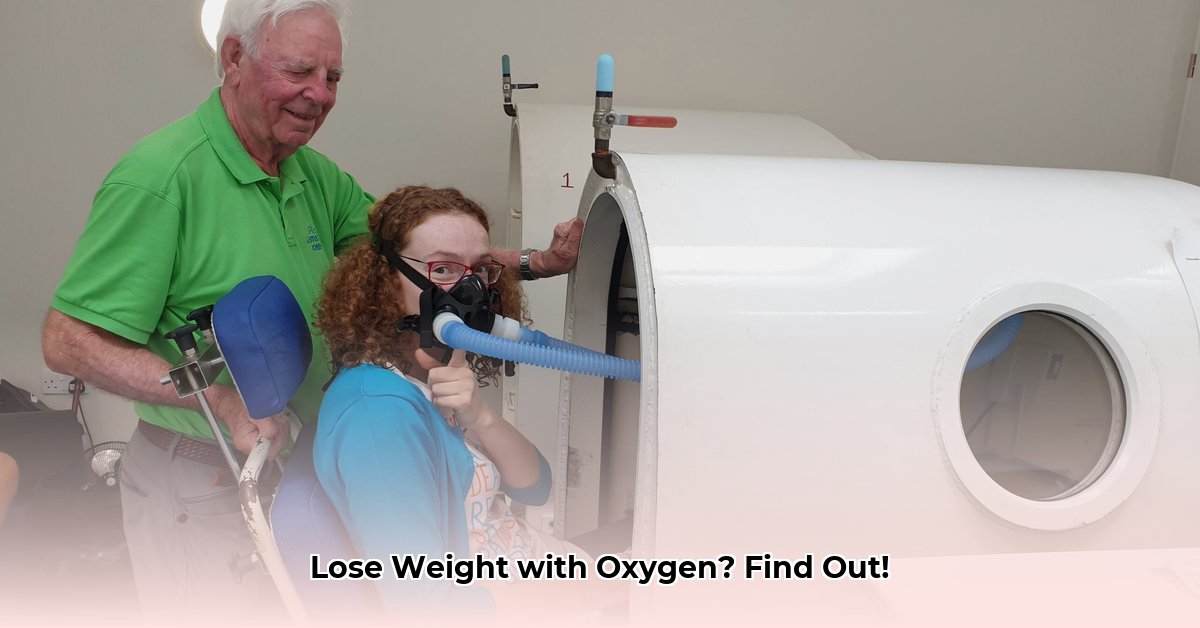
Hyperbaric Oxygen Therapy (HBOT) and Weight Loss: Separating Fact from Fiction
Hyperbaric oxygen therapy (HBOT), involving breathing 100% oxygen in a pressurized chamber, is a medically established treatment for specific conditions. However, its efficacy for weight loss remains largely unproven. This article will explore the established uses of HBOT, the current research (or lack thereof) regarding its connection to weight loss, and the associated risks and costs. We will focus on evidence-based information, clarifying unsubstantiated claims.
How HBOT Works: Enhanced Oxygen Delivery
HBOT increases the amount of oxygen your blood carries, acting like a "supercharged" oxygen delivery system. This enhanced oxygen delivery improves tissue healing, making it effective in treating conditions where oxygen is crucial for repair. However, the mechanism by which this might influence weight loss is currently not fully understood and requires further investigation.
FDA-Approved Uses of HBOT
The FDA has approved HBOT for several conditions, based on robust scientific evidence demonstrating clear benefits:
- Decompression sickness ("the bends"): HBOT replenishes oxygen in the body, mitigating the effects of rapid ascent from depth.
- Carbon monoxide poisoning: HBOT rapidly delivers oxygen to combat the oxygen deprivation caused by carbon monoxide.
- Gas gangrene: The high oxygen concentration helps fight this serious infection.
- Severe wounds and ulcers (e.g., diabetic foot ulcers): Increased oxygen levels accelerate healing.
These are well-established uses with substantial clinical data supporting their efficacy.
HBOT and Weight Loss: A Critical Evaluation of the Evidence
Claims suggesting HBOT as a weight-loss treatment lack strong scientific evidence. While some small studies have suggested a possible correlation between HBOT and weight changes, these results are not conclusive and require replication in larger, well-designed clinical trials. Many anecdotal reports exist, but individual experiences do not constitute robust scientific proof. More rigorous research is needed to establish any causal relationship between HBOT and weight loss. It is premature to recommend HBOT for weight loss based on the available data.
Potential Mechanisms (and the Need for Further Research)
Although currently unproven, some speculate that increased oxygen from HBOT might boost metabolism or influence hormones related to appetite and fat storage. However, these are theoretical mechanisms requiring extensive investigation. Further research is critical to determine whether these theoretical links translate into clinically meaningful weight loss.
Risks and Side Effects of HBOT
While generally safe when administered in accredited facilities by trained professionals, HBOT carries potential side effects:
- Ear or sinus discomfort: Pressure changes can cause temporary discomfort.
- Eardrum rupture (rare): A rare but serious complication.
- Lung problems (rare): Requires careful monitoring during treatment.
These risks are usually manageable with proper precautions and monitoring.
Cost and Insurance Coverage for HBOT
HBOT is expensive, with costs varying based on location, session duration, and number of sessions. Insurance coverage is often limited, primarily covering FDA-approved uses. Given the lack of evidence supporting its use for weight loss, the high cost should be carefully weighed against potential benefits. Discussions with insurance providers regarding coverage are crucial before commencing treatment.
Conclusion: A Balanced Perspective on HBOT and Weight Loss
Currently, there's insufficient evidence to support the use of HBOT for weight loss. While some theoretical mechanisms exist, rigorous clinical trials are necessary to confirm its efficacy. Anecdotal reports should not be interpreted as scientific proof. Before considering HBOT for any purpose, consult your doctor to discuss the available evidence, potential risks, and alternative weight-management strategies. A healthy lifestyle incorporating balanced nutrition and regular exercise remains the cornerstone of effective weight management. Continued research is crucial to determine the potential role of HBOT in weight loss, if any.
Key Takeaways:
- HBOT is an established treatment for specific medical conditions but lacks robust evidence to support its use for weight loss.
- Anecdotal reports exist but do not replace the need for large-scale clinical trials.
- The high cost of HBOT, coupled with limited insurance coverage for weight-loss applications, should be carefully considered.
- Discussions with healthcare providers are essential before considering HBOT for any purpose.